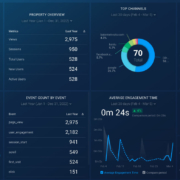How You Can Boost Your Rankings With Keyword Clustering
Choosing the best keyword to focus on for your webpage can be a tall task. You need one that has low keyword difficulty, high search volume, AND suits the content you are trying to create. If you’ve struggled with this in the past, it may be time for you to add keyword clusters to your search engine optimization (SEO) strategy.
Keyword clusters are groups of related keywords that you can use to boost your organic traffic for SEO content found on your website. These can prove to be very useful, as searchers often use many different search terms when looking for the same type of content. Keyword clusters allow you to rank for multiple related keywords, providing more avenues for users to find your content organically.
Terms You Need to Know
Semantic vs. SERP-Based
You can create two types of keyword clusters: semantic and SERP (search engine results page)-based clusters.
Semantic Keyword Clusters
Semantic keyword clusters group SEO keywords together based on their semantic relationships. Semantic clusters are based on natural language processing (NLP) and group together different keywords that share similar or the same meaning. In a semantic cluster, you may see keywords such as “computer,” “desktop,” and “PC” grouped together, as they are all nearly identical in meaning.
SERP-Based Keyword Clusters
SERP-based keyword clusters are grouped based on SERP similarity. These are useful because they focus on the user’s search intent. In a SERP-based cluster, different search queries that yield similar SERPs are grouped. For example, you may see keywords such as “best hotel” and “nicest hotel” grouped together, as those terms yield similar SERPs.
Content Clusters vs. Topic Clusters
It can be easy to mix up content and topic clusters, as they are very similar concepts. Simply put, a content cluster is based on a central page and the content built around it. A topic cluster is based on a central topic and pages with subtopics that relate back to the original. Throughout both of these types of clusters, you place internal links on each page that link to other pages in the cluster.
Pillar Pages
A pillar page is the central piece of content in a cluster. It’s where all of the other pieces of content in the cluster relate back to and is usually where you want to put your primary keyword at the highest focus.
What Are the Benefits of Keyword Clustering?
Keyword clusters are immensely beneficial for ranking highly in SERPs. Want to see a boost in organic traffic? Use multiple related and relevant keywords from your cluster across your content, and let Google’s search algorithm do the rest! Your pages will rank for more than just the single keyword you selected as your primary keyword.
How to Manually Set Up & Use a Keyword Cluster
Now that you have an understanding of what a keyword cluster is and how it can help you rank highly in search engine results, let’s go a little further in-depth and discuss how exactly you can set up these keyword clusters for your own use.
Select What Topic You Want to Make Content About
Before doing your keyword research, you need to know what you’re looking for. Determine the topic you want to focus your content on and use that as the starting point for your keyword research. Remember, high-quality content creation is a crucial part of SEO strategy, and a group of keywords cannot compensate for poorly written content. Make sure you choose a topic that you can write good content about.
Do Your Keyword Research
Now, it’s time to start your research. There are many different keyword research tools that you can use, such as Semrush or Ahrefs. After identifying the topic you want to write about, you can determine the primary keyword to target. From this, compile a list of related keywords to later go into your cluster. Make sure when doing this that you compile a mixture of head, body, and long-tail keywords. It can also help if you look at what keywords your competitors are ranking for in similar content.
Some keyword research platforms include features, such as keyword grouping tools, that allow you to compile a list of keywords within the tool itself. If the tool you are using does not have such a feature, you can easily enter keywords manually into Microsoft Excel, Google Sheets, or any other spreadsheet software you prefer.
Create Your Keyword Cluster
Now that you have created a list of relevant keywords, it is time to cluster them. Choose which kind of cluster you want to use, semantic or SERP-based, and choose the keywords out of the list that best fit the criteria you have laid out. It can also be helpful to keep an eye on the search intent of each keyword. Clustering keywords based on search intent, whether you are making a semantic or SERP-based cluster, can help you select relevant keywords that fit together.
Plan Out Your Content
Content planning is the final piece of the keyword clustering process. Once your keyword clusters are set up, you can set up your pillar page with the main topic and primary keyword being the focus. Use other keywords in the cluster throughout your pillar page to boost organic traffic, and then write new content to support your pillar page, creating a content cluster.
Automatic Clustering
Creating keyword clusters manually can prove to be very time-consuming. Because of this, numerous keyword clustering tools are available. This can save you a lot of time, gathering and grouping a large number of keywords quickly. This way, you can dive right into content marketing and writing.
Need More Help With Keyword Clusters?
Keyword clustering is a very beneficial and pivotal part of SEO strategy, content strategy, and digital marketing strategy in general. Using keyword clusters to create pillar pages and content/topic clusters is a great way to boost your rankings on search engines and increase your organic traffic. With that said, they can be very overwhelming if you are not familiar with the ideas, concepts, tools, and processes involved. Luckily, we are here to help you with all of your digital marketing! Send us a message, and we can help you reach your goals!












